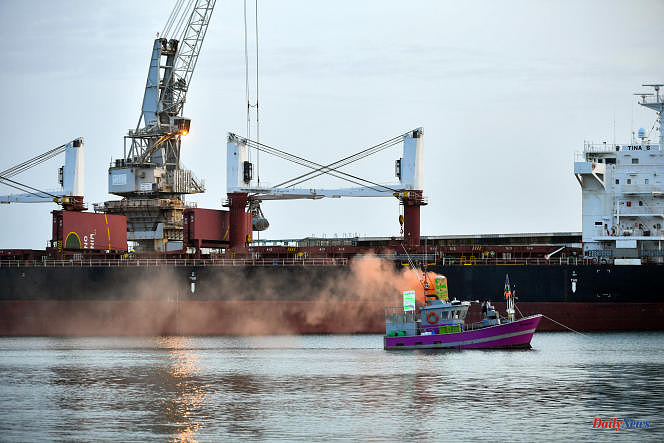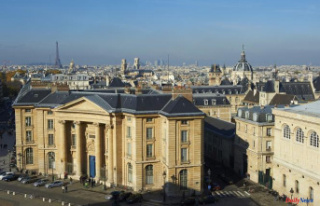A dozen fishing boats blocked the entrance to the commercial port of Bayonne (Pyrénées-Atlantiques) on Wednesday March 29 in the morning to warn of "the death of artisanal fishing", on the eve of an unprecedented "dead line" operation in French ports.
For several days, anger has been rising: strong demonstrations in Rennes or Lorient, blockages in Boulogne-sur-Mer...
Professionals denounce "unsuitable European regulations", in particular the ban on bottom fishing in marine protected areas by 2030, and the recent decision of the Council of State, seized by several environmental defense associations , imposing within six months the closure of certain fishing areas in the Atlantic in order to preserve the dolphins whose strandings have multiplied in the Bay of Biscay.
After a similar operation launched Sunday evening in Boulogne-sur-Mer, the main French port, boats from Bayonne, Saint-Jean-de-Luz or Capbreton, displayed banners with flags on Wednesday in the Adour estuary. messages like "NGO state = death of artisanal fishing" or "seafarers are under threat". "We are here this morning because we have no choice, our survival is at stake," Olivier Mercier, a fisherman from Arcachon, who owns two boats, told Agence France-Presse.
Mr. Mercier assured that the "dolphins trapped in the nets" were only a "minority" and was surprised by the recent presence of these cetaceans in the Seine, the lake of Capbreton (Landes) or stranded alive on beaches in Charente-Maritime. "I think beyond the fishing issue there is an environmental issue, maybe there is something affecting them," he added. “NGOs attack all trades, gillnetters, trawlers, etc. We are harassed. There, it is no longer just the fishing method that is in question, it is the sailor-fisherman who must be eliminated from France, ”denounces Jean-Yves Elissalde, fisherman in Bayonne.
Require answers
For the first time, the National Fisheries Committee is calling for dead days in French ports to demand government responses to this series of "attacks" weakening the sector, in a climate of tensions never seen since the Brexit crisis. Not a boat at sea, not a fish sold, no fish trading, no processing: the unprecedented "dead line" operation is scheduled for Thursday and Friday, with each local committee choosing the day or days that suit it.
In Boulogne-sur-Mer, where the mobilization began on Sunday evening with the blocking of the port, the auction closed on Tuesday: fishermen warned European ships spawning in the Channel not to come and unload their fish. "The cup is full and we must give a future to all the actors in our sector because today the horizon is gloomy," says the National Fisheries Committee.
The committee specifies that these "dead line" days are the result of "unitary action", coordinated between fishermen, auctions and fishmongers: because, in the long term, "the disappearance of part of the fleet will directly threaten the entire fishing basin. employment from ports to processing plants".
After a meeting with the national committee, the Secretary of State for the Sea, Hervé Berville, said on Tuesday that he was "in solidarity with the spirit of the movement" and promised to "strengthen the collective work" undertaken , in particular against certain European regulations, in a statement to AFP. Fishermen are calling for the payment of diesel aid, "some of which has not been paid for six months", and the harmonization of fishing control rules and vessel safety in France, where a complex administrative layering paralyzes investments for lack of of visibility. In a word, they rebel against the "disengagement" of the state.
"Avoiding Violence"
The observation is bitter, while the French fleet has already decreased by more than a quarter in twenty years and that national fishing represents only 25% of the fish sold on the stalls. After Brexit, which resulted in the scrapping of ninety ships, professionals judge the very existence of the sector "compromised by incessant harassment and piecemeal support without support towards a vision future".
They expressed this anger to the President, Emmanuel Macron, in an open letter sent last week and have since demanded to be received by the Head of State. Pending a response, the Fisheries Committee "calls on all professional representatives to suspend their participation in environmental management bodies".
A gesture of discontent but also the sign of deep distress, when for five years, "fishermen have been at the initiative of scientific and technical programs to determine avoidance solutions (repellent sonars, special nets), to reconcile activities fishing and dolphin protection" and that they have "already limited fishing periods and areas" to "take care of the resource", according to the chairman of the committee, Olivier Le Nézet.
Mr. Berville renewed the State's commitment to fight against the European plan on the prohibition of bottom trawls and said his desire to "find the way with all the actors to continue to deploy an action plan against incidental captures of cetaceans". He also pledged to facilitate the "administrative daily life of fishermen". Will that be enough? “We want to avoid any movement of violence. And that is why we warn that we must act now. Now we want answers and a clear timeline,” Le Nézet said.












